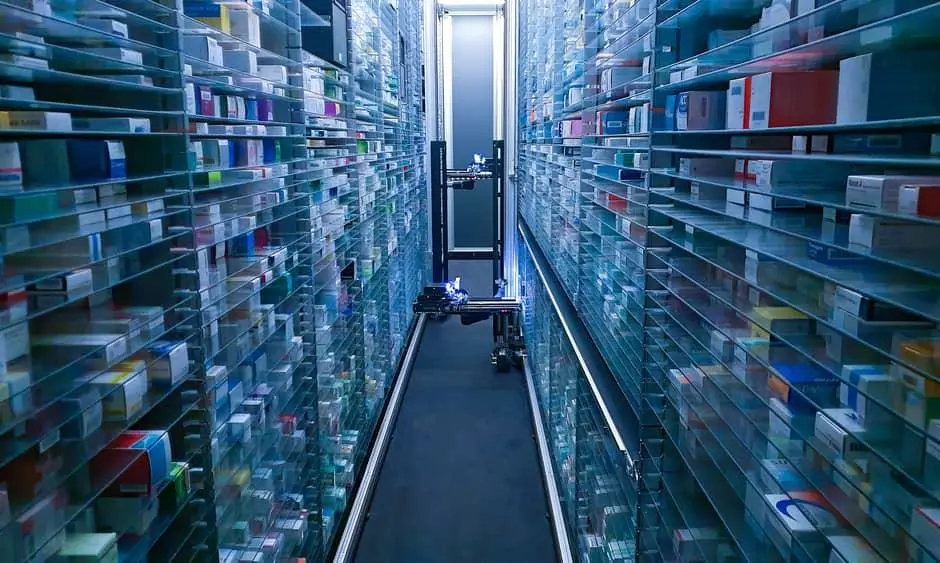Pharmaceutical logistics landscape of India

India's pharmaceutical exports surged 9.67% to $27.9 billion in 2023-24, despite a 3% dip in overall exports, according to commerce ministry data. The Indian pharma market relies on evolving logistics. With India supplying 60% of the world's vaccines, the sector is projected to generate $7.61 billion in logistics revenue by 2032.
The Indian pharmaceutical industry, often referred to as the "pharmacy of the world," has established itself as a global powerhouse in drug manufacturing and export. However, the success of this sector hinges not only on production capabilities but also on the intricate web of logistics that ensures medicines reach patients safely and efficiently. As India continues to expand its role in the global pharmaceutical market, the importance of a robust, reliable, and innovative logistics infrastructure cannot be overstated.
India's pharmaceutical industry has experienced remarkable growth over the past few decades, cementing its position as a key player in the global healthcare landscape. Statista forecasts that revenue from the domestic pharmaceutical market is set to reach $13.16 billion in 2024. This growth is driven by factors such as increasing healthcare awareness, rising incomes, expanding healthcare infrastructure, and government initiatives to improve healthcare access. It further says that India's pharmaceutical market size is projected to reach $450 billion by 2047. As of June’s report, the Indian pharmaceutical market delivered a healthy revenue growth of 8.8% year-on-year.
Not only in terms of market size but also in manufacturing and export, India is one of the biggest global suppliers of low-cost vaccines, producing 60% of the world's supply. According to a report by the Government of India, the country is also the largest provider of generic medicines globally, occupying a 20% share in the global supply by volume. The industry manufactures about 60,000 different generic brands across 60 therapeutic categories. India's pharmaceutical exports surged by 9.67% to $27.9 billion in 2023-24, despite a 3% dip in total exports, according to data from the the ministry of commerce.
“Armed with our robust infrastructure of over 4,000 vehicles and 100+ cold storages across 600+ cities in India, our company is strategically positioned to expand beyond hyperlocal deliveries into longer-distance pharmaceutical transport.”
Swarup Bose, Celcius Logistics
India exports pharmaceuticals to over 200 countries. It meets over 50% of Africa's demand for generics, nearly 40% of the generic demand in the US, and approximately 25% of all medicines in the UK.
In addition, the pharmaceutical sector has become a prime destination for foreign investors and has emerged as one of the top ten most attractive sectors for foreign investment in India.
The pharmaceutical logistics sector in India is a complex ecosystem involving multiple stakeholders, including manufacturers, distributors, retailers, and third-party logistics providers. This network is responsible for ensuring that drugs are transported and stored under optimal conditions, maintaining their efficacy and safety from production facilities to the end-users.
According to a report by Inkwood research, the Indian pharmaceutical logistics market is projected to grow at a CAGR of 9.00% during the forecast period of 2024-2032. By 2032, it is expected to reach a revenue of $7.61 billion.
This growth is fueled by the expanding pharmaceutical industry, increasing demand for temperature-sensitive drugs, and the rise of e-pharmacy platforms. The sector has seen significant developments in recent years, particularly in cold chain logistics. This growth is also driven by the increasing production and export of vaccines and biopharmaceuticals, which require stringent temperature-controlled environments throughout the supply chain.
Despite its growth and potential, the Indian pharmaceutical logistics sector faces several challenges. Infrastructure gaps remain a significant hurdle, with many rural areas still lacking adequate logistics networks, making last-mile delivery challenging. Maintaining the cold chain for temperature-sensitive drugs is another major challenge, especially in a country with diverse climatic conditions. Adhering to evolving national and international regulations for drug transportation and storage adds complexity to logistics operations.
The highly fragmented nature of the Indian retail pharmacy market complicates distribution networks, while ensuring the authenticity of pharmaceuticals throughout the supply chain is an ongoing challenge. Additionally, there's a shortage of skilled professionals in specialised areas like cold chain management and quality assurance in logistics.
To address these challenges, the Indian pharmaceutical logistics sector is increasingly adopting technology and innovative solutions.
“We ensure stringent quality and temperature control of pharmaceuticals during the last-mile delivery process through a combination of advanced technology and meticulous operational practices. Utilising our proprietary SaaS platform, we integrate IoT devices and real-time monitoring systems into their fleet of vehicles. Our systems continuously monitor temperature conditions and other critical parameters during transit, ensuring that pharmaceuticals remain within specified temperature ranges. Any deviations trigger immediate alerts to the operations team, enabling swift corrective actions to maintain product integrity. Additionally, we have employed trained personnel and standardised protocols for handling and delivery, further ensuring that pharmaceuticals reach their destinations safely and in optimal condition, thereby meeting regulatory requirements and customer expectations seamlessly,” says Swarup Bose, Founder & CEO at Celcius Logistics.
In addition to this artificial intelligence and machine learning are being used to optimise route planning, predict demand, and enhance inventory management. Automated warehouses and robotic systems are improving efficiency and reducing human error in storage and distribution. Big data analytics is helping companies make informed decisions about supply chain optimisation and demand forecasting.
“We ensure that the first, middle & last mile is monitored throughout the supply chain with proper tracking of the shipments & handled by JCL-trained staff.”
Prakash Singh, Jeena Criticare Logistics
“Blockchain enhances transparency and traceability by securely recording transactions across the supply chain, ensuring the integrity of temperature-sensitive products. It mitigates risks associated with data tampering and unauthorised access, thereby improving compliance with stringent regulatory requirements. These technologies enable real-time monitoring of environmental conditions and rapid response to deviations, safeguarding product quality during transit,” adds Bose of Celcius Logistics
“We have developed our software per the latest industry requirements with a mobile app for pick up registration, manifest, live tracking & proof of delivery (POD) upload after delivery. We can also customise the software as per customer requirements & provide an interface between our software and the customers logistics management software. Our shipments are moving in Jeena Criticare Logistics (JCL) operated vehicles, we also have our own master air waybill (MAWB) stock with the airlines. We ensure that the first, middle & last mile is monitored throughout the supply chain with proper tracking of the shipments & handled by JCL-trained staff,” says Prakash Singh, COO of Jeena Criticare Logistics.
Jeena Criticare, a healthcare logistics specialist in India, ensures vital medical supplies like blood samples and vaccines reach their destinations safely. They provide services which include temperature-controlled transport, customisable solutions, and a wide delivery network across India.
The regulatory environment for pharmaceutical logistics in India is evolving to keep pace with industry growth and global standards. The Central Drugs Standard Control Organisation (CDSCO) has been working on implementing Good Distribution Practices (GDP) guidelines to ensure quality and integrity of pharmaceutical distribution. Good Distribution Practices (GDP) ensure that pharmaceutical products are stored, transported, and handled under appropriate conditions to safeguard their quality and efficacy.
The government is in the process of finalising regulations for e-pharmacies, which will have significant implications for pharmaceutical logistics. However, since no definitive policy has been established so far, e-pharmacies continue to face legal uncertainty and operational difficulties. Regulatory bodies have been also updating guidelines for cold chain management, particularly in light of Covid-19 vaccine distribution experiences.
The government is facing increased expectations as Finance Minister Nirmala Sitharaman prepares to unveil the Union Budget 2024 later this month, prompting industry leaders in the pharmaceutical sector to call for a renewed emphasis on their sector.
“To achieve a $130 billion industry by 2030, the budget should prioritise research and development, following the example of last year's Promotion of Research & Innovation Programme (PRIP) Scheme. This goal can be met by investing more in integrating technology and AI to enhance speed and accuracy. We anticipate policies that assist the pharmaceutical sector with tax relief, such as lower or nil GST rates, to facilitate business operations. Additionally, considering the pharmaceutical sector's reliance on exports, we expect credit schemes and policies to support international trade. Simplifying access to international markets will strengthen India's role in the global pharmaceutical industry. Lastly, to promote the "Make in India" initiative, the budget should include low-interest rates and grants to boost domestic manufacturing setups, particularly for domestic active pharmaceutical ingredient (API) manufacturers,” says Srivardhan Khemka, Director of Sanjivani Paranteral Ltd.
“We anticipate policies that assist the pharmaceutical sector with tax relief, such as lower or nil GST rates, to facilitate business operations.”
Srivardhan Khemka, Sanjivani Paranteral Ltd.
Experts also propose a multimodal approach that strategically integrates road, rail, and air freight, balancing urgency and cost considerations. This approach enhances delivery efficiency and timeliness while reducing reliance on any single, fluctuating transportation mode. In addition, there are logistics companies now offering hybrid sea/air solutions that aim to find an optimal balance between cost efficiency and swift delivery.
“Govt of India has taken good initiative for the logistics industry by introducing PM Gati Shakti & the National Logistics Policy along with digital technologies such as the unified logistics interface platform (ULIP). These policies have enabled ease of doing business. We are planning to provide GPS tracking of all our vehicles, and riders to the customers so they can get the live location of their shipments. We are also planning to reduce our carbon footprint in future by shifting to e-vehicles & we have already moved to BS VI & CNG vehicles for 1st & last mile transportation,” states Singh of Jeena Criticare Logistics.
Sustainability is likely to become an increasingly important focus for the pharmaceutical logistics sector. As awareness of environmental issues grows, there will be increasing pressure on the industry to reduce its carbon footprint and minimise waste. Investing in technology-driven logistics facilities can transform drug storage and handling practices, setting high standards. For example, optimising package sizes not only cuts down on storage and shipping expenses but also fosters sustainability efforts. We may also see more investment in green transportation solutions, such as electric vehicles for last-mile delivery
As the sector evolves, it will continue to be a critical enabler of India's vision to be the world's pharmacy, driving accessibility, affordability, and quality in global healthcare.

Parijat Sourabh
As a news correspondent at STAT Media Group, I cover stories on logistics, aviation, and air cargo. Feel free to contact me at parijat@statmediagroup.com


